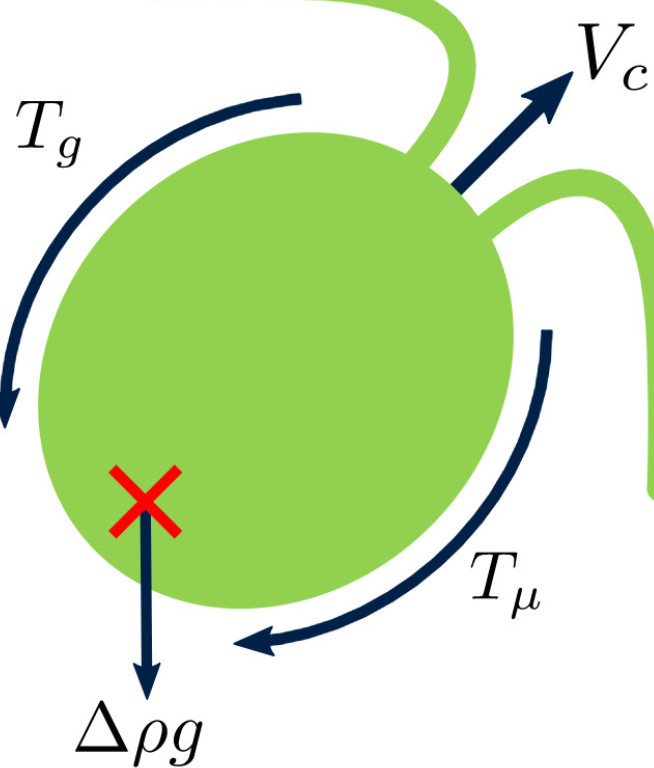Lloyd Fung - PhD Student
Lloyd’s thesis title is "Where would all the algae go?" - Modelling the collective behaviour of swimming microorganisms in fluid

Background
“I have been studying at the Department of Aeronautics since 2012. I had a year in industry with Rolls Royce between 2014-2015 and graduated from the department with an MEng in aeronautical engineering in 2017.”
Research and applications
“If you leave a petri dish of swimming microorganism - such as some types of algae - suspended in a fluid for some time, often, you will see convective patterns emerge from the initially quiescent suspension. Such a phenomenon results from complicated interactions between the fluid flow, the biology, geometry and motility of the microorganism and the environment.”
“My multi-disciplinary project investigates how we can model this kind of pattern formation from a fluid dynamics perspective. A particular challenge is that the collective behaviour often occurs at a length scale orders of magnitude larger than the individual organism, making direct computational modelling unfeasibly costly. The research's key objective is to find ways to overcome the challenge in modelling their collective behaviour via a deep understanding of the mechanism behind the phenomenon. For example, some algae, when placed in a long vertical pipe, would self-focus into plumes. The mechanism behind the observation, known as gyrotaxis, is the novel interaction between their bottom-heavy geometry and the flow around them.”

“The gyrotactic mechanism is vital in the ecology of the ocean. Gyrotaxis is responsible for trapping phytoplanktons at a certain depth due to the shearing flow in the ocean. Since phytoplanktons form the basis of the marine food chain, the trapped phytoplanktons attract other marine life and create an ecological hotspot. The mechanism is also believed to be responsible for harmful algal blooms sometimes. It may also be a significant factor in the carbon cycle modelling, as phytoplanktons are accountable for the majority of the natural carbon removal from the atmosphere. As one can see, accurate modelling of these microorganisms' transport has important consequences to our understanding of marine ecology and climate change.”
“On the engineering front, engineers can design more efficient bioreactors by using the self-focusing mechanism of biofuel producing algae. When carbon-based fuel is still likely to be needed for aviation in the foreseeable future, biofuel might offer a low-carbon alternative to fossil fuel. Unfortunately, biofuel production from algae remains costly, partly because it takes a large amount of energy to harvest the product from the bioreactor. The self-focussing mechanism might offer a cost-free way to concentrate the algae for extraction, thereby reducing biofuel production cost.”
Aspirations and Studying at Imperial
“For my post-doc, I am planning to continue my research on swimming microorganisms in the Department of Applied Mathematics and Theoretical Physics in the University of Cambridge, under the support of a fellowship from Peterhouse College.”
“Researchers are like explorers in the deep forest of unknowns or divers deep diving in the sea of knowledge. It is an exhilarating job with certain elements of risks and surprises. In a PhD, you are an apprentice guided by a mentor in this unknown. Still, you are responsible for your own survival in the forest or the sea. You need to work hard to keep up, but you will also gain more control over your research pathway as you gain the skills of exploration and knowledge of the landscape. The adventurous and entrepreneurial nature of fundamental research, especially when compared with working in the industry, attracts me to do a PhD.”
“I enjoy taking ownership of my work. My supervisor (Dr Yongyun Hwang) has given me a lot of freedom in pursuing new knowledge and exploring the research landscape. We have a good working relationship, and his guidance has been valuable at times.”
“I am also grateful for the computational infrastructure in the college. It allows me to do exploratory yet heavy computation on the central cluster CX1. With the support of an unmatched bandwidth, my theoretical work has been greatly accelerated by the computational resource available, especially when I can produce high-quality data without waiting for a long run.”
“Theoretical work can be tough sometimes: there were times when our theory or methodology hit a roadblock. There were also times when we simply cannot understand the data at hand. Fortunately, with the support of the consumable fund from my scholarship, I was able to attend conferences, meet the right experts in the field and even visit some of them. They have been very helpful in resolving some of the challenges I faced.”
Advice
“I have lived in London for eight years since I started my undergraduate study at Imperial. London has become my home, and I love spending time in this cosmopolitan city. I particularly enjoy encountering people from all walks of life and culture.”
“Don't be afraid to step way out of your comfort zone, both in terms of disciplines and reaching out to supervisors. Whether or not your background is related to the PhD project you want to pursue, you are learning much more during the PhD in both breadth and depth anyhow. Most supervisors welcome students to reach out to them for a PhD, especially if you are applying for scholarships to fund your PhD. For scholarships, you may want to apply early September-October.”


